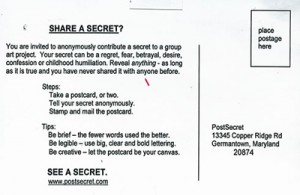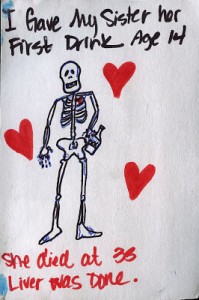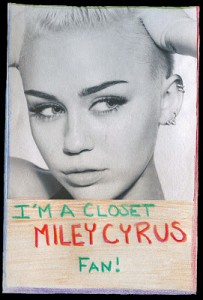This week in ASTU I was introduced to the blog Post Secret, an ‘ongoing community art project’ created by Frank Warren. The project encourages people to anonymously mail in homemade postcards with a secret written on it. Images of a selected number of postcards are then posted on the blog for the world to see. The handmade postcards themselves are visually beautiful, simple and creative, but the secrets they display are often heart breaking. Prior to Post Secret was Frank Warren’s first project called “Reluctant Oracle”. This project released ‘a new work’ every week for people to randomly find. It ran for about a year, with the last message being, “You will find your answers in the secrets of strangers.” This mysterious message could be thought of as a preface to Post Secret, and ultimately it’s main goal. Post Secret intrigued me as a particularly unusual form of life narrative that aims to help people release their secrets, empower others who view the postcards to share their own secrets, and in the process help both the creators and viewers ‘heal’ and “find their answers”.

We have been analyzing different types of life narratives in class, but it struck me that Post Secret was unlike the other forms of life narration we had worked with. This was because all the posts on the blog were brief, created by different people and most importantly anonymous. Post Secret utilizes the power of anonymity, as a way to encourage people to share their deepest, darkest secrets; things they wouldn’t even tell their best friends, but are willing to share with the Internet because no one will know their identity. For this reason people are able to share tragic secrets like the postcard (below) that reads, “I Gave My Sister her First Drink Age 14… She died at 35 Liver Was Done. In this life narrative you can tell the creator of the postcard feels responsible for the death of their sister, a secret that for many people would be almost impossible to share. It is raw secrets like this that you wouldn’t see on a public site like Facebook or twitter, because the confession would be attached to your personal profile. 
Not all of the posts on Post Secret are as tragic as that example though. Many are light hearted like this postcard for example (below) that reads, “I’m a closet Miley Cyrus fan!” If someone were to post this a few years ago it would have had less comedic and culturally relevant value, but because of the uproar in reaction to the recent behaviour of Miley Cyrus, it’s easy to see why someone would secretively be a fan of hers, and want to confess this on a site where people are unable to criticize you. Unlike Facebook, where a simple, honest confession could face negative reactions and rude comments directed right to you. 
Now that I have talked about how Post Secret utilizes the unique power of anonymitity for life narration, I will continue this discussion into my next blog post, where I will talk about the aspect of how Post Secret acts as a form of therapy to help its users heal.
*All pictures were accessed from http://www.postsecret.com on October 27, 2013.
